Fountainhead of Change
She is also the undersecretary general of the United Nations, and previously held the post of deputy minister of South Africa. It is interesting to note that a woman loaded with the choicest designations began her journey with the humble profession of a teacher. Even today, among the causes she champions, Education for All remains at the top of the list. Dressed in hues suited to endorse Orange the World, Phumzile Mlambo-Ngcuka spoke of violence against women, and the urgent need for its prevention, at the WeUNiTE: Investing in Planet 50-50 conference in the city.
Q&A with Phumzile Mlambo-Ngcuka
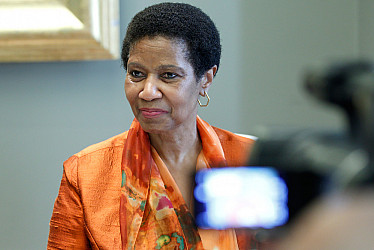
Q. You were deputy president of South Africa. Being the only woman to have held the post, did you face any gender-based discrimination?
A. Not really. I was too powerful!
Q. Why do you think there are such few women politicians nowadays even though there are quotas for their inclusion?
A. I think the stereotypes against women are still very strong in all societies. They are prominent among both men and women, but even women don’t vote for women. We need to work very hard to change those norms so that there’s greater belief in a female leader. As more women increase in leadership positions, so will the role models, and more women will be willing to make themselves available for leadership.
Q. What happens when a violation of human rights is attributed to religion, with regard to practices, such as female genital mutilation or child marriage? How does one combat this?
A. Public education is important. There is no religion that says you have to mutilate a child. We also have to call the bluff of people who, in many ways, perpetrate what is actually a crime against women and children in the name of religion. In any case, in all countries that are constitutional states, the constitution is the supreme authority. In all constitutions, everywhere in the world, life is protected. That is why we have laws who help us bring the perpetrators to court.
Q. What happens when a news piece, like the one about Yazidi women being forced into sex slavery or of the Chibok schoolgirls’ kidnapping, breaks out? What can the UN do?
A. We need to be there beside the parents. They go through lots of trauma. We need to mobilise public and international opinion to be in support of the girls, to insist that those that are responsible for protecting the girls will play their part. And that is what we have continued to do. And when we have been able to receive the girls that have come back (and unfortunately we do not have all the girls back) we have helped them to integrate into society. The UN Women does not have the capacity to fight Boko Haram, but we work with law enforcers from different countries to improve safety. It works out much better when we are working closely with the leaders of those countries. Sometimes that is possible, and sometimes, we don’t have the kind of collaboration that is necessary.
Q. In many parts of the world, it is extremely difficult for women to stand up for themselves, leave alone make a breakthrough in a gender-based environment. Why is that even in developed countries women find it hard to progress beyond a point, and are unable to break the glass ceiling?
A. I go back to stereotypes. They are so strong. A woman in Wall Street, and a woman in a sugarcane farm in Brazil; a woman in a shop floor in India, or a factory in South Africa – what do they have in common? They are all paid less than their male counterparts in most places. The international average is that women are paid 24 per cent less than their male counterparts for work of equal value. That happens to women right at the top who are CEOs, or women in the middle, or women right at the bottom. There is an almost unconscious bias among those who make decisions about how women are paid. You have to turn the attitude around. And that is why working with the private sector is critical, because you want to have a critical mass of CEOs who will go out of their way to check – if women in the company are paid equally. If not, why…and what do we need to do in order to make it right?
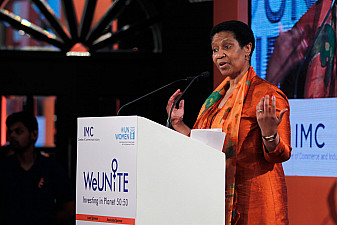
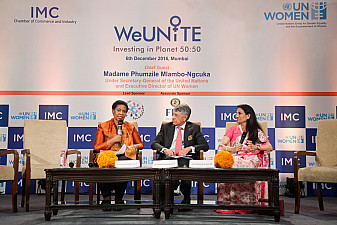
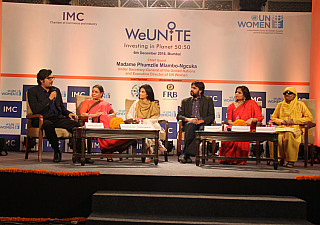
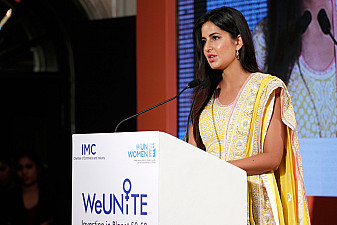
At the WeUNiTE: Investing in Planet 50-50 conference, Mlambo-Ngcuka announced a partnership between UN Women and India’s IMC Chamber of Commerce and Industry to boost women’s entrepreneurship and empowerment. The event had actor Katrina Kaif in attendance, speaking about ‘women power’.She revealed that the strongest person she knows is her mother, pointing out that this may be the case for most of the attendees. Panel discussions with Arnab Goswami, Anil Dharker, Chanda Kochhar, and acid attack survivor, Haseena Hussain gave much insight into the work done on the issue.
Related posts from Verve:
Verve Trending
Sorry. No data so far.
us on Facebook to stay updated with the latest trends





